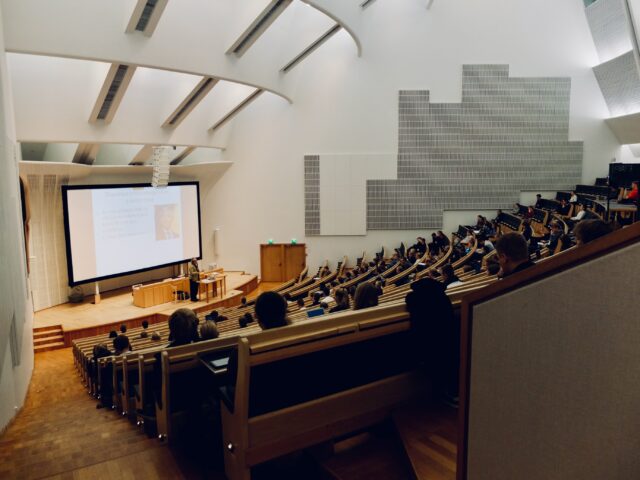The Government of Saskatchewan will launch a new Post-Secondary Student Council this fall to give students the opportunity to engage directly with the Ministry of Advanced Education on policies, issues, and trends pertaining to postsecondary education. The council will consist of 20 SK postsecondary students who will be nominated by their respective institutions to represent a broad range of interests, backgrounds, and experiences. “Engaging students in conversations around their post-secondary experience will help us better understand what helps them to succeed,” said SK Advanced Education Minister Gordan Wyant. “This student council will give us a platform to connect with students and gain valuable insights and perspectives.”

Top Ten News
April 6, 2023
St Lawrence College, Queen’s University, and the University of Manitoba have each announced changes to their policies and procedures. SLC has adopted Confederation College’s Indigenous Learning Outcomes (ILOs) to better incorporate Indigenous knowledge and understanding into its programs. The ILOs ensure that all students graduate with knowledge and learnings related to seven key learning outcomes. Queen’s has announced a new interim Indigenous hiring policy that is based on best practices for verifying Indigenous identity. UManitoba’s Board of Governors has announced a new policy to integrate responsible investing principles into its decision-making, as part of its broader commitment to advance reconciliation, sustainability, and climate action. The Winnipeg Free Press reports that this policy follows the release of a report on UManitoba’s commitment to prioritize social and environmental issues.
The University of Saskatchewan and Cambrian College have both launched new research facilities. USask has launched its University of Saskatchewan Insect Research Facility (USIRF), which the institution says is the first facility of its kind at a western Canadian university. The facility will host research that will support Canadian agriculture, reduce risk to food security, and provide insight into insect ecology, as well as supporting collaborations with USask Crop Development Centre plant breeders. Cambrian has opened a new Chemical Analyses and Scientific Services (CASS) Lab, which will support research for industries such as agriculture and food, construction, and energy through a wide variety of services. Industry clients, students, faculty, and staff will come together at the lab to solve the challenges facing industry members.
Vancouver Community College and the Scottish Qualifications Authority (SQA) have signed an agreement that will provide learners with access to international college degree programs. VCC will have access to SQA’s curriculum and will be able to offer expanded transfer opportunities for students interested in learning abroad. “One of the academic priorities in VCC’s Strategic Innovation Plan is to deliver sustainable programming and student services that align with the college’s institutional values, community, and the labour market demands,” said VCC VP of Administration and International Development Ian Humphreys. “This partnership with SQA aims to do exactly that: fast-track students into the labour market while also exposing them to job opportunities in Canada and abroad.”
The College of the North Atlantic and Khoi Nguyen Investment (KNI) Group have signed a memorandum of understanding (MOU) focused on establishing an international college in Vietnam. CNA will assist the Vietnamese college with developing the organizational structure and staffing; creating the syllabus and curriculum; advising leaders on program equipment and infrastructure; supporting student and faculty exchanges, and mapping program. The collaboration pertains to nine different areas of study, including agricultural technicians, cybersecurity, and early childhood education. “To have students emerge from this international college with education credentials from CNA, that are accredited by Canadian authorities, means we are continuing to do our part to address the global labour shortage and help boost local economies,” said CNA President Liz Kidd.
The Government of British Columbia recently announced plans to consolidate Kelowna’s nursing education. Previously, the Bachelor of Nursing (BSN) program was delivered through both the University of British Columbia Okanagan and Okanagan College; effective September 2023, the BSN will only be offered through the university. This will reportedly allow Okanagan to expand its programming into other areas of healthcare education, including practical nursing and pharmacy technician training. “This shift, once fully approved, protects our robust program in the Okanagan at UBCO,” said Okanagan Provost and VP Academic Andrew Hay. “It also allows our institutions to continue working together to support even more students interested in careers in health professions.”
As the sector debates the future of the English degree, many English departments are employing innovative approaches to attract new students, give relevancy to the major, and inject some “pizzazz” into English studies, writes Johanna Alonso for Inside Higher Ed. Many institutions are bridging the “creative and analytical sides of English” to attract students, and the author outlines some of the related strategies being undertaken by English departments. These include adding new courses – like creative writing – to appeal to a wider array of students and working to dispel the myths about English students’ employability by highlighting its applicability to careers in podcasting, website development, and communications.
Redeemer University and Athabasca University have recently announced new programs. Redeemer is launching a new bachelor of communications and media studies degree program with a concentration in media production that will give students the opportunity to gain foundational skills in the field. Students will learn skills that can be applied to fields such as marketing, social media, filmmaking, and commercial videography. AU’s Faculty of Science and Technology has launched an Innovative and Diversified Energy Resources micro-credential that will address sustainable energy skills gaps. The micro-credential consists of four courses, each of which awards a digital badge.
Simon Fraser University has announced the end of its varsity football program. SFU President Joy Johnson said that the decision was made after the Lone Star Conference decided not to renew its affiliate membership agreement with SFU for football earlier this year. “We made this decision now to give students time to make other plans for their athletic careers if they so choose,” said Johnson. “We will support football athletes who want to explore options outside of SFU, and will honour athletic scholarship commitments for those who choose to remain at SFU and meet eligibility requirements for the 2023-24 school year.”
If liberal education is to be truly transformative, it should “nurture awe on and off campus,” writes Andy Tix for Times Higher Education. Tix explains how experiencing “awe” expands and changes our mental frameworks, which in turn positively affects learning and development. From a psychological perspective, Tix writes that experiencing “awe” in the classroom could greatly benefit the student’s education. The author concludes that postsecondary institutions should prioritise “awesome” educational practices like internships, field trips, community events, and study-abroad programmes.
